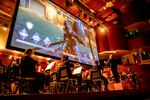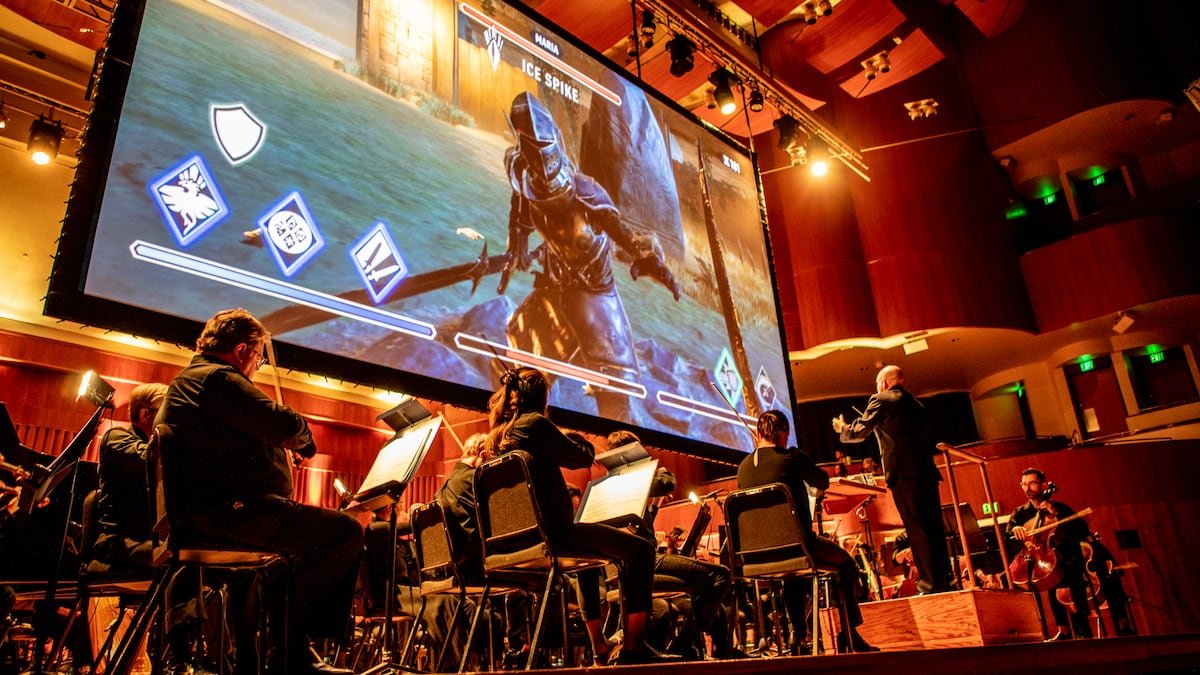
“Heroes: A Video Game Symphony” takes audiences through a hero’s journey, crafting a unique story using scores from fan favorite video games like The Legend of Zelda, Skyrim, God of War and dozens more. The Oregon Symphony will perform “Heroes” Thursday, Jan. 18, at the Arlene Schnitzer Concert Hall in Portland, Ore.
Courtesy of JMP Enter / Courtesy of JMP Entertainment
If you play any video games, music might not be the first thing you notice — but you probably remember it long after setting down the controller.
Jason Michael Paul has spent the last 20 years creating and producing video game concerts featuring the music from beloved game franchises like The Legend of Zelda and Final Fantasy. His latest concert series, “Heroes: A Video Game Symphony” features musical arrangements and visuals from the worlds of Zelda, Skyrim, God of War, Halo, World of Warcraft and dozens more.
The Oregon Symphony will be performing “Heroes” on Thursday, Jan. 18, at the Arlene Schnitzer Concert Hall in Portland.
OPB’s Donald Orr spoke with Jason Michael Paul about his own hero’s journey into producing the concert. Listen in, or read an edited transcript of their conversation below.
Donald Orr: When you sit down to play a new game, does the music stand out to you first?
Jason Michael Paul: Absolutely. It’s something that really brings me in, and reels me in. There’s not really a game I could think of that doesn’t have a good soundtrack along with it.
Orr: What kind of role do you think music plays in games?
JMP: It’s becoming more and more important, I think. The stories become more complex, and we’re going more towards a “Hollywood” kind of style of video game. These soundtracks become ever increasingly more popular, and believe it or not, they’re actually being recorded with full orchestras now — and choirs for that matter.
Orr: So the theme of the concert is the classic framework of a hero’s journey. Video games have no shortage of heroes to choose from — so how did you go about curating this particular selection of games and songs?
JMP: Yeah, every chapter in the story has a game that I felt was appropriate for that particular chapter. As you can tell by the setlist, we have some pretty epic heroes: Dragon Age, of course, Mass Effect. Starfield even, a new game that just came out; Bioshock. And we even have the final fantasy music as well as the Legend of Zelda music. I’ll leave you to see if these games that I chose for each chapter is fitting or not.
Orr: How is it different for an audience to sit in a venue and passively listen to the music, versus listening to the music while actively playing a game?
JMP: I think that’s the wonder of this program. Gamers can actually come to a venue like the Schnitzer in Portland, and they can just sit back and relax. And they can really focus on the beauty of the music being performed live by a full orchestra, and then the visuals are merely an accompaniment. This is the one time probably in a gamer’s life where they can actually just enjoy the show.

Jason Michael Paul has produced over 300 video game music concerts, including concert tours for The Legend of Zelda and Final Fantasy. For the “Heroes” concert series, a 70-piece orchestra will be joined by a choir to perform new arrangements from multiple video game franchises.
Courtesy of JMP Entertainment
Orr: You’re dealing with franchises that have gone through the hands of a number of different game developers over the years — but also different composers. How does it feel to bring their music to life for generations of fans, but also newer audiences who may have never played these games?
JMP: It’s kind of a dream come true. A lot of these composers whom I’ve worked with over the years, they never could have dreamt of having their music performed by some of the most esteemed orchestras in the world. In the early days of course, it was just bips and bleeps. And truth be told, a lot of these people, these composers were just salaried employees of these gaming companies. So to see their music be appreciated, to have these orchestras, they really add a tremendous amount of credibility, and they actually feel very appreciative. It only further inspires them to want to keep doing what they’re doing — and it also further inspires me to keep doing what I’m doing.
Orr: Before we go, I wanted to know — what games did you grow up playing, and do you have any new favorites?
JMP: So I was born in 1977, so I can tell you that I played on every console when I was a kid — even Pong. I played the Commodore 64, I played the Atari; my first system was the NES. My best friend across the street, we were battling, playing you name it: Castlevania, Legend of Zelda; Duck Hunt, of course, Mario. I grew up on this stuff. Michael Jackson’s Moonwalker… I still remember when that game came out. I haven’t talked about this in a long time, but it’s all part of my quilt that I’ve been weaving together over the years.
My best memory is really when my dad started playing with me, and that was when we got the [Sega] Genesis 16 bit. And boy, my block was hot, let me tell you. Because not only were the kids playing, but the parents were playing with us — and that was pretty fun.


Leave a Reply